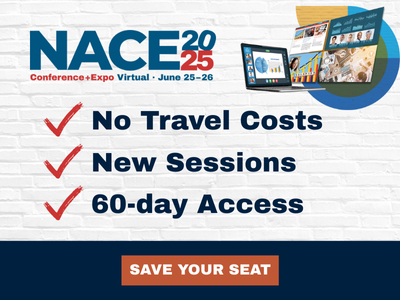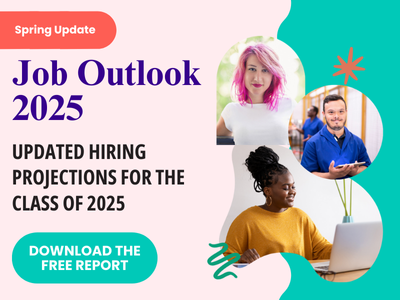When Dr. Julia Overton-Healy asked her colleagues in the NACE Community about how career services can motivate students, she expected to receive new ideas she could apply to her work. But, Dr. Overton-Healy, director of career services at St. John Fisher College, did not receive a “magic answer” or even some effective solutions. She did, however, hear from others experiencing similar frustrations about students’ lack of urgency and acknowledging the limitations of a rooted approach in a fluid ecosystem.
Dr. Overton-Healy has experienced this frustration more frequently in recent years. She tells of a finance major graduating in May who told her that he “will worry about a job hunt after I take a break. Maybe I’ll start looking in July.” When she mentioned student loan payback and the fact that for many students, the job hunt can take six to nine months, he just shrugged and said, “I will deal with it when I need to.”
Or the history major who, when asked what his after-graduation plans are, said, “I’m not even sure what I can do with this degree. I guess I’ll work retail until I figure it out.”
“Admittedly,” she says, “these are anecdotal, but they do represent the general malaise toward engaging in active job-search steps.”
This led Dr. Overton-Healy to rethink her original question and determine that “the answer about 'firing up' students isn’t about firing them up. It's about recalibrating our understanding of who they are,” Dr. Overton-Healy concludes.
“These are the COVID ‘kids’: increased isolation, diminished academic performance, heightened mental health issues. They are overwhelmed … and go into freeze mode. The conflict for them is real: academic demands, personal challenges, financial concerns. They simply cannot accommodate adding one more thing, such as the job search, to their lives. Many students don't have the mental, emotional, or psychological reserves to go there.”
She cautions that this does not apply to all students; every school has shining examples who seem to manage it all with grace, confidence, and resilience.
“But in my 30+ years in higher ed, with most of that in career services, I'm seeing a significant shift in the way students step forward into adulthood: with greater caution, anxiety, and avoidance,” Dr. Overton-Healy explains.
She says the St. John Fisher College career services team conducts plenty of outreach to support students before commencement, but does not see a significant increase in the number of appointments for job-search help, resume refinement, or coaching on networking as one would expect to occur in April prior to graduation in May.
“However, we do see an uptick in requests for help two or three months after graduation, from our new alumni who struggle to ‘launch,’” she says.
“That’s an indicator, to me at least, that the urgency isn’t real until they are in the ‘real’ world. But I think it’s really important to acknowledge this is not applicable to all students. Some are really hustling, doing all the things they should, and finding success. I imagine that, for some of their peers, they see their friends’ success and may feel too inadequate to take action. The competitive stress doesn’t necessarily impel them; it can deflate them.”
Her colleagues and others echoed her concerns and her frustrations, specifically citing:
- The many competing pressures students manage;
- Students having expectations that may not align with reality;
- Students being unsure about careers because institutions have not adequately implemented career readiness into their curricula;
- Students lacking knowledge about how long and involved a full-time job search is;
- The system being broken long before the COVID-19 pandemic, but, to react to it, career services offices simply using their traditional tools with “virtual” in front of them;
- Students’ delayed development exacerbated by COVID and the lingering effects of helicoptered childhoods, a crazy labor market that seems to reinvent itself every four months or so, and the ponderous pace of higher ed; and
- Perhaps stunned by fear, students reacting to the changing job world—one where jobs that never existed before and newly developed roles come into career management systems daily—by waiting to see how it plays out.
As student attitudes, outlooks, and needs have shifted, career service offices have not effectively accounted for or addressed them. Doing so requires career services offices to not only recalibrate to better understand who their students are, but to also assess their own place in students’ lives—and perhaps in the recruiting process—and redefine themselves, if needed.
Dr. Overton-Healy notes that career services practitioners do truly care about doing right for and by their students, “but for some reason, we keep stubbing our own toes on doing the usual and typical things that clearly aren’t getting attention or buy in.”
“I get a real sense that it’s not just the students who are detached, nor is it just us who are frustrated,” she continues.
“It’s the change of the ecosystem, the larger context we’re working in now, and the world our students will graduate into.”
One discussion participant suggested changing the very structure of how students experience careers. Instead of pushing students right into the “engagement” of the summer internship/co-op or the “marriage” of a full-time role, he wrote, give them more opportunities to “date” through real work experiences.
Dr. Overton-Healy agrees that employers are critical to the solution. For instance, they can develop and provide these real work experiences for students. They can also nurture committed relationships with career services offices so partnerships can grow deeper roots, extend branches that reach out across campus and beyond, and, ultimately, bear more fruit for both. For some, however, there has been a move away from the latter.
“On the one hand, I think employers are already driving this, and to some extent, leaving campus career experts on the side,” Dr. Overton-Healy says.
“With various technology platforms, the historical connector function that the career services office serves is becoming moot. We’re being bypassed, and to be frank, I think that’s the business model of these tech platforms. Witness the rise of ed tech or upskilling options. This is squeezing us, the middle-person, if you will, out.”
On the other hand, she says, employers still need career services to help them identify pools of talent and to assist with brand management on campus.
“We can facilitate building a sense of community between students and an employer—and a sense of belonging runs very deep for college students,” Dr. Overton-Healy explains.
“They feel isolated, but crave connectedness. We can also be the interpreter between students and employers: We ‘speak’ both. And finally, we are the best partner to build competencies in students. We are the coaches to get students ready so employers aren’t as mired in remedial professionalism training or tedious onboarding.”
Dr. Overton-Healy maintains that career services professionals will never be replaced by digitizing the mechanics of a job search.
“While we're jockeying for greater visibility with our senior leadership and fatter budgets, and collaborating with virtually every constituent associated with higher ed, we're being called to worry less about the mechanics, and focus more about how we influence and guide young adults who just don't understand why they need us because the digitized world is convincing them a career is a matter of clicking the right links,” she says.
“I guess the big takeaway for me is this: It’s time to reinvent what we do and be unafraid to let go of what we’ve always done.”
An important step is making “career” as much a part of the total college experience as are academics, clubs, and athletics. That doesn’t come without its challenges.
“As a profession, we have been trying to do that now for quite a while with varying levels of success, but I wonder if we practitioners need to think about abandoning the idea that ‘career starts in year one,’” she says.
“We may want that to happen, but I don’t think many of today’s college students are really ready for that conversation, or even to think about that conversation. Honestly, they have a lot on their plates, and the last two years have deeply influenced their skills, and by extension, their belief in their own agency.”
So, how does the profession start recalibrating? Dr. Overton-Healy says this work starts with doing research on who the students are, what drives them, where their best energies go, how they make decisions, and more.
“However, career services still operates within a very stodgy, clunky system tied to a timing schedule that just doesn’t align with the speed of life now,” she points out.
“What we as career services practitioners believe should be done regarding a job search or career readiness may be terribly out of step with what students experience and the pace set by employers, accelerated by technology. I’m not saying we abandon career development theories, or counseling skills, or traditional modes to support employer engagement on campus, but I really believe we need to make honest, and difficult, decisions about why we keep doing what we do and have done if it doesn’t fit the world our students are preparing for.”
For example, with all the resources available for how to create a decent resume, why are career services offices still spending so much time doing resume reviews?
“Maybe career services folks need to sit down and ask a hard question: What would my work look like if I wasn’t consumed with approving jobs, generating emails to students, scheduling interview days, organizing fairs, proofing cover letters, doing workshops, and more?,” Dr. Overton-Healy asks.
“It’s a scary proposition, but perhaps would help us shape how we help students in the ways they need help now and in the future.”
She expects that she and her team will spend much of this summer reimagining what career services does on their campus and how they spend their best energy.
“We are the career experts,” Dr. Overton-Healy says, “but it doesn’t matter how much wisdom we have if the delivery doesn’t appeal to students. We’ll keep leveraging our faculty partners to keep career in the classroom conversations, but other systems and mechanisms that consume so much of our attention might be given the ‘ol’ heave ho.’
“I’m unafraid to try something bold. I’m OK with learning through failure. So much has changed in the world just since 2019, but we haven’t. Not really. We flipped to using Zoom for appointments and we use a virtual platform for the fairs, but those were reactive changes. It’s time we become future-forward.”




